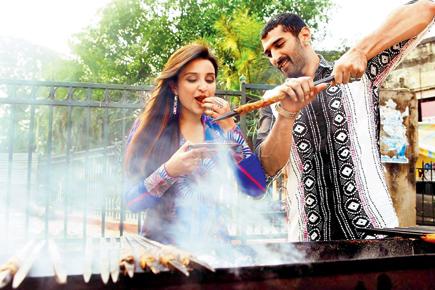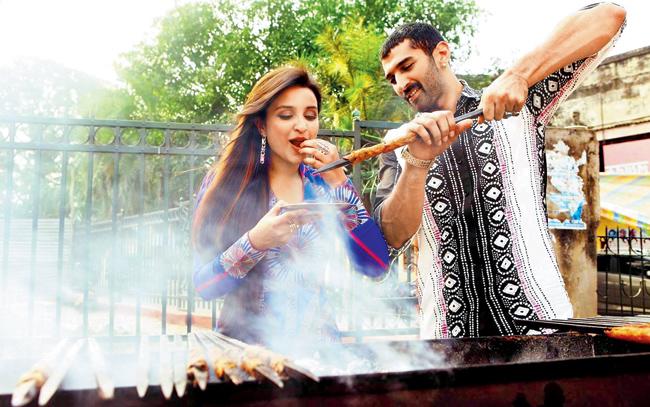Bollywood has been doing a lot for women lately. Actually for a while, but some recent releases have taken significant leaps ahead, in a sea of miasma

Daawat-e-Ishq
 Bollywood has been doing a lot for women lately. Actually for a while, but some recent releases have taken significant leaps ahead, in a sea of miasma. Habib Faisal’s Daawat-e-Ishq (Feast of Love) is an exhilarating film, alongside Vikas Bahl’s Queen, topping a list that includes Band Baaja Baaraat, Mary Kom, Chak De! India and more.
Bollywood has been doing a lot for women lately. Actually for a while, but some recent releases have taken significant leaps ahead, in a sea of miasma. Habib Faisal’s Daawat-e-Ishq (Feast of Love) is an exhilarating film, alongside Vikas Bahl’s Queen, topping a list that includes Band Baaja Baaraat, Mary Kom, Chak De! India and more.
It is crucial to look beyond film ‘reviews’ to ‘reading’ a film from a holistic perspective. To examine what the film is actually saying, which can be quite different from what it appears to be saying. Mardaani, for instance, is pitched as a feminist film, but it was so demeaning to a woman cop — putting her in bed, tied up, with a pimp, and so voyeuristic — give me masala any day, than a Bollywood wolf in sheep’s clothing.

Daawat-e-Ishq is an anti-dowry film wrapped as a foodie film
But, Yash Raj Films, that gave us Mardaani, redeems itself with Daawat-e-Ishq. An anti-dowry film wrapped as a foodie film? Wow, that’s a McCombo to beat all others. The film is about Gulrez, a spunky, middle-class, educated, Muslim woman from Hyderabad (Parineeti Chopra) who, deeply insulted by gutless, potential grooms and greedy in-laws demanding dowry, hatches a plan to take advantage of the law — Section 498A which makes dowry illegal — to teach the men a lesson and fund her dream of further studies in the US. The film’s flaws include convenient twists, but essentially, an insulted Gulrez initially misuses Section 498A to take revenge, and blackmails the groom Tariq (Aditya Roy Kapur), but returns his money when she finds true love. The movie represents the daring triumph of true love and honesty over tradition, religion, greed, male insecurity, and much else that causes millions of Indian women to be abused, raped and murdered.
Here’s what I like about the film: the breezy self-confidence of a medium-city Muslim woman, ambitious, in control of her life, not cowering in a burqa or being a pawn in a game of patriarchy. She supports her single dad and plans to study in the US. It also celebrates small-town men: Tariq exudes a cocky confidence—he admits he’s neither a body builder type, nor a BA pass, but he runs a successful restaurant business, is not insecure about a far more educated wife, and he loves her even though she cheats him. And it honours the invisibles: its delightful songs and dances featuring waiters, autorickshawallahs and a nankhatai band, and lovers smooching everywhere amidst Lucknow’s tehzeeb-soaked ruins.
More to like: how both protagonists protest against dowry. Earlier, when Gulrez’s boyfriend’s parents demand dowry, she yells at them in front of everyone, “No burger, no cold drink, no “help” (dowry). Just leave… Bloody vegetarian!” It’s a powerful line, and very funny. This, in Hyderabad, famous for marrying teenage girls to ageing moneybags. And when Tariq’s parents demand dowry, he finds a very Indian jugaad solution: he secretly gives Gulrez the dowry to pay his parents! He cheerfully submits to a “trial by food” to woo Gulrez, even distributing lunch to his rival potential grooms. The film scores delightfully on many key social issues via food and laughter. Hmm — worth asking Indian women if they prefer great food to great sex in a marriage — I suspect we will get very surprising answers.
Daawat-e-Ishq shows how women can be empowered by using 498A — those demanding dowry can be sent to jail and pay substantial amounts in damages. Importantly, it is also realistic and shows how some women misuse this law — whose numbers are negligible, compared to the number of men violating this law. More daring, the young couple gets married without a religious ceremony —marriage in Islam is a contract — they simply say ‘qabool’ before two witnesses, their parents. It is breathtaking for a Muslim couple in Bollywood to get married even without a qazi, that too in Lucknow. All these are powerful signals from Bollywood, especially the Yash Raj empire.
Here’s looking at you, Habib! Now, if only someone would make a movie about Mary Kom, told from the viewpoint of her husband Onler, who has given up his career to devote himself to her boxing career and look after three kids. No Bollywood fantasy could match that extraordinary reality.
ADVERTISEMENT
Meenakshi Shedde is India Consultant to the Berlin Film Festival, an award-winning critic, curator to festivals worldwide, and journalist. She can be reached at meenakshishedde@gmail.com.
The views expressed in this column are the individual’s and don’t represent those of the paper.
 Subscribe today by clicking the link and stay updated with the latest news!" Click here!
Subscribe today by clicking the link and stay updated with the latest news!" Click here!







